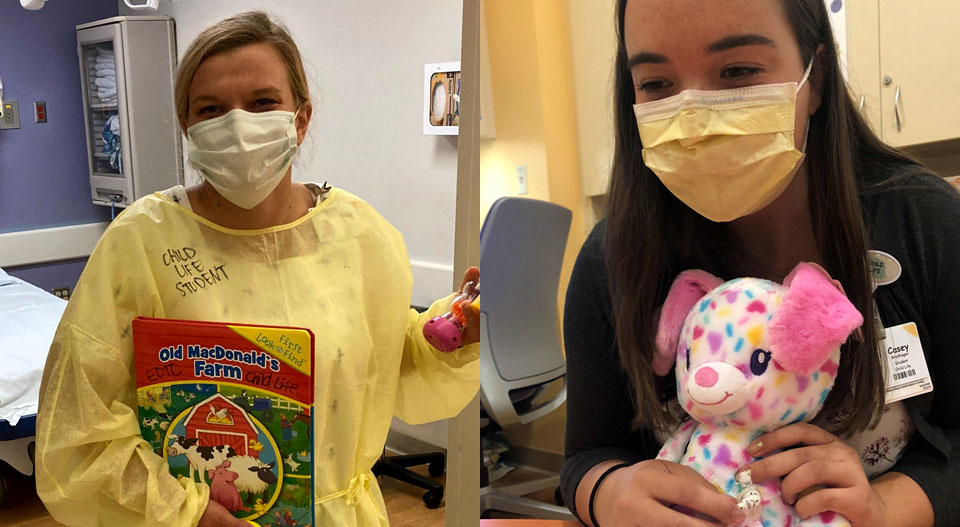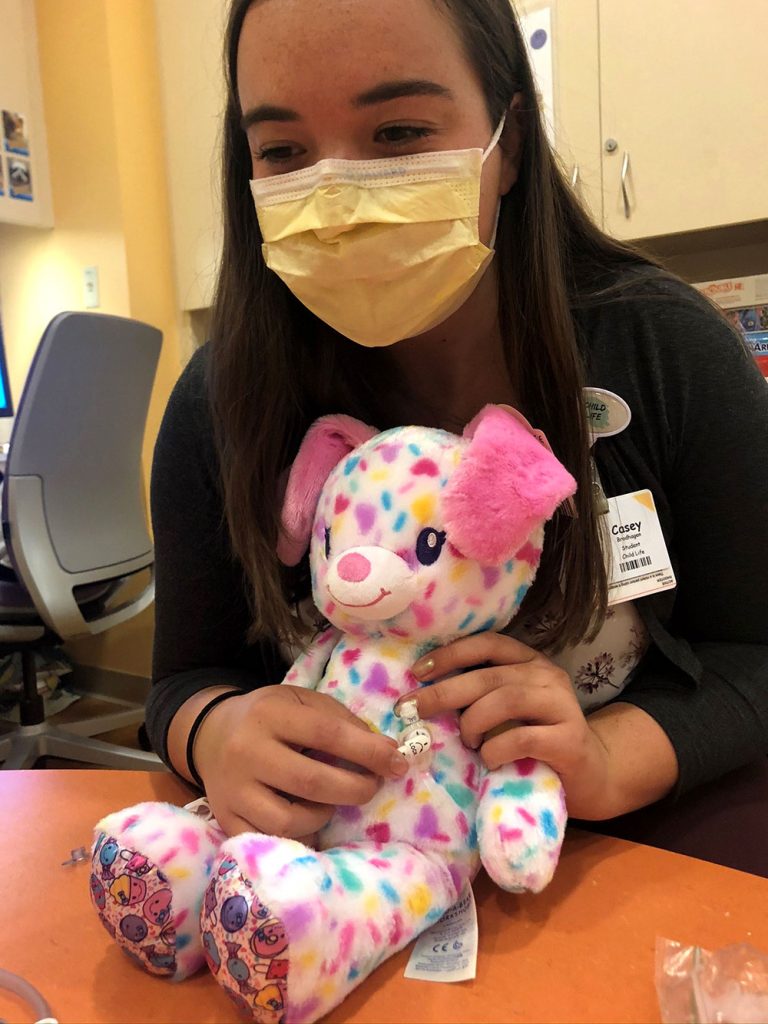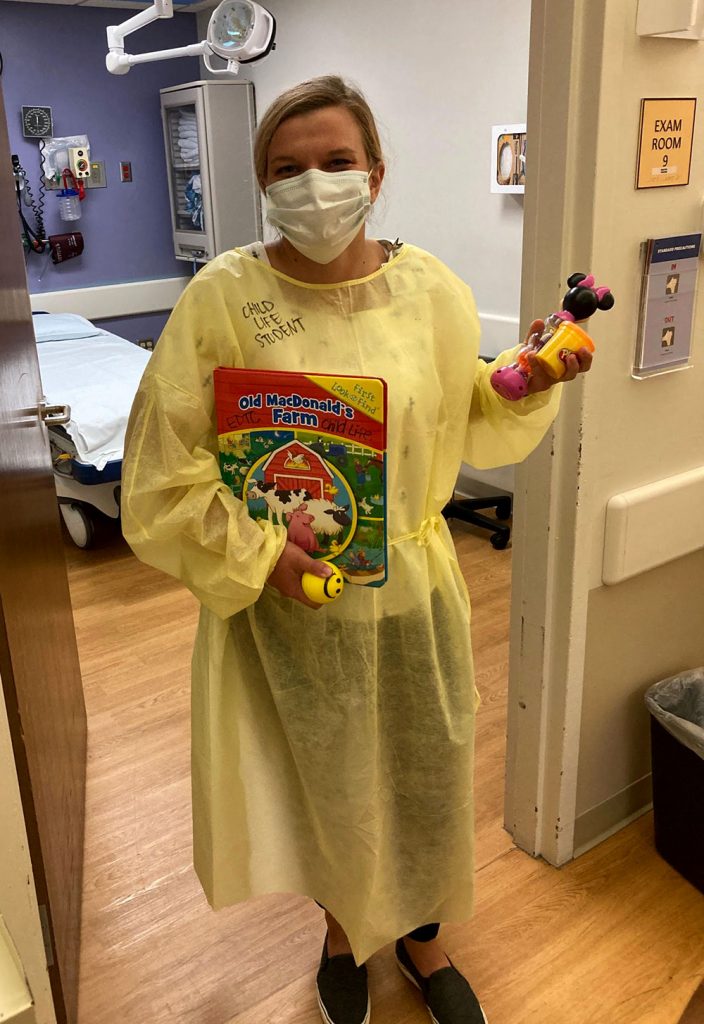
When a child is sick, needs emergency stitches or an MRI, a hospital or clinic visit can be scary. A child life specialist can ease the anxiety for both the patient and parents.
By demonstrating the use of medical equipment in a nonthreatening manner, offering coping plans or distractions in the form of a game or a comforting stuffed animal, child life specialists (CLS) help prepare the patient for procedures. This normalizes the environment and makes it less stressful for patients, their families and health providers.

For Casey Brodhagen of Wausau, a May 2020 graduate in family and consumer sciences from UW-Stevens Point, a career as a child life specialist blends her interests in health care and child development.
“This is a perfect fit for me,” she said. “The focus is always on the children, with added support for parents and siblings. Child life specialists teach them about their diagnosis, prepare them for procedures, create and implement coping plans, and offer developmentally appropriate toys and activities to help foster a sense of normalcy while they’re in the hospital to promote positive coping. We also provide memory-making and death and bereavement support for surviving family members or for a child who loses a loved one.”
Learning the skills needed for this kind of patient care takes many hours of education, hands-on experience and a qualifying exam for certification.
The only public university in the state with a CLS program, UW-Stevens Point offers a Child Life Specialist Preparation Certificate, which integrates with majors in family and consumer science, sociology, psychology or health sciences. The certificate requires 10 courses in the topics of child development, human anatomy, medical terminology, ethics, family systems, research, therapeutic play and grief and loss. In addition, a 600-hour internship and qualifying exam are required. Many students also complete a practicum, which aids their placement into competitive internship opportunities across the country.
Two years ago, Brodhagen transferred to UW-Stevens Point and spoke to Professor Sterling Wall in family and consumer sciences about taking courses toward a CLS career. Wall’s research showed a need for education in this field and adding the CLS certification.
“This is a growing field in hospitals,” said Wall. “The data is clear that child life specialists have an impact on health outcomes and meeting a family’s needs.” Children interacting with a CLS need less medication and take less time in procedures, which helps reduce costs as well, he said.
Creating a well-rounded CLS program at UW-Stevens Point included tapping courses from other programs, creating new ones in therapeutic play, grief and loss, and working with Marshfield Children’s Hospital to create practicum experiences for UW-Stevens Point students. Brodhagen’s experiences in practicums at Marshfield and another at a pediatric hospice and palliative care organization in Jacksonville, Fla., helped Wall put the grief course together. This fall, 20 students are working toward the CLS certificate.
Interest in UW-Stevens Point’s program has grown through the Child Life Association of Stevens Point (CLASP), a campus student organization that Brodhagen began at the encouragement of a mentor at Marshfield. Within a few months of its creation, five CLASP members, including Brodhagen, presented research at the National Association of Child Life Professionals conference. The project was a collection of interviews with child life specialists across the nation to learn about their career paths in this extremely competitive field.
Brodhagen completed an internship at Children’s Wisconsin, a Wauwatosa hospital. Her experiences included time in outpatient specialty clinics, a trauma intensive care unit and an acute care unit. She helped children by explaining procedures, demonstrating the medical equipment, and teaching coping techniques such as deep breathing and distraction.
“The huge difference we can make is worth it,” she said. “We can offer our patients choices and support that turn a negative experience around. Even providing a soothing touch is a win. We take pride in that.”

Katie Uhlenbrauck of Hortonville had already earned a bachelor’s degree in health promotion and wellness at UW-Stevens Point when she returned to earn the CLS certificate. Like Brodhagen, she was looking for a career in health care that helped children. Many of her degree classes fit into the new program’s requirements, and Wall and Professor Corey Huck helped complete paperwork so she could earn credits during a practicum experience at Children’s Wisconsin.
She spent three weeks shadowing a CLS on the oncology/hematology floor and three weeks in the emergency department.
“I learned how to assess patients and tailor care to fit the needs of all different age groups of children,” she said. “I learned how to implement coping plans, and individualize care to offer developmentally appropriate procedural preparation, support, and activities to help make the hospital environment a more welcoming place.”
Uhlenbrauck hopes to work in an inpatient setting and someday be a therapy dog handler that helps to brighten a child’s day through animal assisted therapy.
While the field is growing in children’s hospitals, the child life specialist skillset is also valuable in dental offices, schools, funeral homes, crisis shelters and specialty summer camps – anywhere children need support.
“The biggest role that a child life specialist takes is being an advocate for the young patient and their family,” said Brodhagen, who recently passed her certification exam. “We treat them as a child first, not as their diagnosis.”
